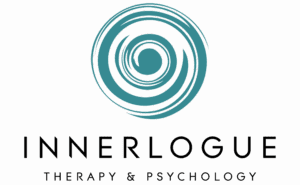Award‑Winning Calgary Psychologists & Counsellors
In‑person and online therapy for individuals, couples, families and youth across Alberta.
Innerlogue Therapy & Psychology brings together a diverse team of registered psychologists and counsellors who are passionate about your mental health. Whether you prefer in‑person sessions at our Kensington and Midnapore offices or secure virtual therapy anywhere in Alberta, you’ll receive compassionate, trauma‑informed support from experienced professionals.
We Are Here to Help!
Not sure if counselling is right for you? You’re not alone. Life in Calgary can be busy and stressful, and many people don’t know where to turn. At Innerlogue, we believe no concern is too big or too small to discuss. Our psychologists draw from years of experience and operate from a trauma‑informed, culturally sensitive perspective. We provide mental‑health support to neurodiverse children, teens and adults, couples and families, and we proudly stand in solidarity with the 2SLGBTQ+ community. Support might come from within, from your community or from a professional like us—wherever you are on your journey, we are here to listen.

Start your healing journey today
At Innerlogue Therapy & Psychology, we offer multiple ways to get started. You can call us today to schedule your free 15-minute consultation or you can book online.
Our Commitment

As mental health therapy providers, we are committed to standing in solidarity with the 2SLGBTQ+ community. We believe everyone, regardless of sexual orientation, gender identity, or expression, deserves access to counselling therapy or mental health care that is equitable, inclusive, and affirming.
Looking for Psychologists in Calgary?

Finding the right therapist can feel overwhelming. At Innerlogue, we make it easier by meeting you where you are, emotionally and geographically. Our Calgary psychologists and counsellors support individuals, couples, and families with care that’s personalized to your goals.
Whether you’re navigating stress, working through past trauma, parenting challenges, ADHD or autism, or simply wanting healthier relationships, we’ll walk alongside you with proven strategies and compassionate guidance.
With offices in Kensington (NW) and Midnapore (SE) plus online sessions anywhere in Alberta, support is always close at hand. And because being understood matters, many of our therapists offer counselling in English, Mandarin, Cantonese, Vietnamese, French, and Ukrainian.
What We Can Help With
Our Calgary psychologists treat a wide range of mental‑health concerns and life challenges, including:
- Anxiety, Stress & Burnout – Learn coping strategies and regain peace of mind.
- Depression & Low Mood – Rebuild motivation and find hope again.
- ADHD, Autism & Learning Differences – Access assessments and therapy to support executive functioning, social skills and academic success.
- Parenting Challenges & Family Conflict – Improve communication and family dynamics.
- Trauma, PTSD & EMDR – Heal from past experiences with trauma‑focused therapies.
- Grief, Identity & Life Transitions – Navigate loss and change with compassionate guidance.
- Relationship & Couples Counselling (Gottman Method) – Enhance connection, trust and intimacy.
- Cultural & Cross‑Cultural Stress – Address identity, acculturation and cultural differences in a safe space.
- Psychoeducational, ADHD, Autism & Gifted Assessments – Gain insights into learning needs and strengths.
- Motor Vehicle Accident & Workplace Stress – Process trauma and stress related to accidents or occupational issues
If you don’t see your concern listed here, please contact us—chances are we can help or refer you to a trusted specialist.

Why Choose Innerlogue Therapy & Psychology?

- Trusted Experts: Our registered psychologists and counsellors are known for their diverse training, cultural understanding, and award-winning care.
- Care on Your Terms: Choose in-person therapy at our convenient NW or SE Calgary locations, or book secure online sessions across Alberta, with evenings and weekends available.
- Simple & Affordable: We offer direct billing with most major insurers and reduced-fee options with practicum therapists.
- Inclusive by Design: From multilingual therapy to 2SLGBTQ+-affirming care, we welcome you as you are.
- Easy Access: Free parking and public transit connections make visits stress-free.
Types of Therapy with Innerlogue
At Innerlogue we support individuals going through different phases of life. We understand that trauma affects everyone differently, and it can manifest differently depending on the type of trauma. Our PTSD and trauma therapy services provide a safe, structured environment for individuals to process traumatic experiences. We use evidence-based modalities such as EMDR, Trauma-Focused CBT, and somatic approaches to reduce symptoms like flashbacks, hypervigilance, and emotional dysregulation. Treatment is individualized to support healing, resilience, and long-term recovery.
At Innerlogue, we support every couple at different stages of their relationship including pre-marital counselling, conflict resolution, infidelity recovery and blended family dynamics. Whether you are LGBTQ+ or anywhere on the spectrum of love, we provide a safe space for partners to thrive in their relationship. Using treatment modalities such Emotionally Focused Therapy and Gottman couples therapy, We help partners to rebuild trust, improve communication, and deepen connection.
If your child is having trouble focusing or you’re noticing signs of inattention, you’re not alone—and we’re here to help. At Innerlogue, our Calgary-based team offers caring, comprehensive ADHD assessments to provide clear answers and a supportive path forward. We also specialize in psychoeducational and gifted assessments to better understand your child’s unique strengths and learning needs, helping them thrive at home, at school, and beyond.
At Innerlogue, our anxiety therapy services are designed to support individuals. We understand that Anxiety can be overwhelming, with repetitive worries and thoughts clouding your mind and paralyzing you from making sound judgement, leaving you feeling drained and stuck. Using evidence-based approaches such as Cognitive Behavioral Therapy (CBT) and mindfulness-based interventions, we help clients identify underlying causes of anxiety, develop effective coping mechanisms, and improve overall emotional regulation. Therapy is tailored to each individual’s needs to support long-term psychological well-being.
We understand the importance of language and culture in mental health. Cultural Competence is crucial to us. At Innerlogue, our team includes multilingual psychologists in Calgary who speaks Mandarin, Cantonese, Vietnamese, French, and Ukrainian, ensuring therapy in a language you’re comfortable with.
At Innerlogue, we understand that experiencing a motor vehicle accident can lead to a range of psychological responses, including acute stress, anxiety, depression, and post-traumatic stress symptoms. Our MVA therapy services focus on trauma-informed care to help individuals process the emotional impact of the accident, reduce symptoms, and support recovery. We use evidence-based approaches such as EMDR, CBT, and somatic therapies to address both immediate and long-term psychological effects, with treatment plans tailored to each client’s unique experience and needs.
Ready to get started?
Finding the right psychologist is an important step. Research shows that the therapeutic relationship is a key factor in successful outcomes, so we’re committed to connecting you with the best therapist for your needs. Book your free consultation today and take the first step toward feeling better.
Frequently Asked Questions (FAQ)
We understand that opening up to someone you just met can be challenging. You can share as much or as little as you want during the session. Each session lasts approximately 50 minutes, during which we will formulate goals together and explore how to best support you and your family. We strongly encourage you to start by arranging a 15-minute FREE phone consultation to determine if we can help or if other referrals may be more suitable. Please discuss with your therapist if you require 90-minute sessions.
All information that is shared in counselling is confidential and no information will be released to any third party without explicit written consent from you according to the Freedom of Information and Protection of Privacy Act (FOIPP) and/or Health Information Act (HIA). There are exceptions when there are imminent and grave harm, this will be clearly explained to you on our first session.
Our Psychologists, Social Workers, Counsellors and Provisional Psychologists fees can be submitted to your insurance for claims if we are not able to submit direct billing on your behalf.
We can direct bill Alberta Blue Cross, Alberta School Employee Benefit Plan (ASEBP) (Teachers and School Support Staff), Green Shield, Medavie Blue Cross (RCMP, Canadian Forces, VAC), Canada Life, Manulife Financial, Chambers of Commerce Group Insurance Plan, Equitable Life, Desjardins, First Canadian, and Financial Services (iA) and many more. This list changes depending on the insurance companies.
For those with Treaty Status (First Nations and Inuit) who are covered by Indigenous Services Canada (ISC) Health Benefits or the Non-Insured Health Benefits Program (NIHB), we are able to direct bill to the NIHB program.
Not all therapists accept direct billing and is dependent on your insurance coverage. It is always best to check with your insurance company. Please reach out to find out more.
Research has shown that how the client feels about their therapist and their relationship contributes to more than 50% of therapy outcome. We strongly encourage you to find a psychologist who is qualified, and makes you feel heard, and you can work well with. All of our therapists work from a client centered approach, are culturally sensitive and trauma-informed. Please book an intake session with our intake staff to find out more.
We occasionally have practicum students available who offer free or low-fee counselling options to help build their clientele. If you’re seeking affordable counselling, please visit our contact page for more information.
Please check out our Fees and Policy section for the latest update about costs.
Registered Psychologists in Alberta are allowed to see clients virtually in Alberta, New Brunswick and Nunavut.
We are able to serve clients virtually across Alberta, including: Calgary, Edmonton, Red Deer, Lethbridge, St. Albert, and Medicine Hat, Camrose, Canmore, Banff, Okotoks, Chestermere, Cochrane, Airdrie and more.
We accept virtual payments via credit cards, including American Express, Visa, MasterCard, debit cards, and Interac e-transfer.
What is counselling, and how can psychologists help me?
Psychological counselling is a professional service provided by trained Psychologists and Counsellors that helps individuals address emotional, mental, and behavioral challenges. It provides tools to cope with stress, improve relationships, and achieve personal growth.
How do I know if I need psychological counselling?
You might need counselling if you’re feeling overwhelmed, anxious, depressed, or facing challenges that impact your daily life, relationships, or work. It’s also helpful for personal growth or navigating life transitions.
How can Innerlogue team of Calgary psychologists and counsellors help me?
At Innerlogue Therapy & Psychology, we provide evidence-based psychological services to help individuals and couples feel confident in navigating life’s challenges. Our registered social workers and Calgary psychologists have extensive experience working with a wide range of concerns, including relationship issues, anxiety, and depression. As a counselling centre in Calgary, Alberta, we offer counselling services for individuals, couples, and families, for those facing difficulties in their relationships. We are committed to providing compassionate and professional care, adhering to the standards set by the College of Alberta Psychologists. If you’re looking for quality counselling services in Calgary, book an appointment today and take the first step toward healing and growth.
Why pick Innerlogue Therapy & Psychology?
Registered psychologists and counsellors with years of experience
Specialized therapy for trauma, anxiety, ADHD, and more
Affordable psychologists in Calgary with direct billing options
Flexible scheduling, including evening and weekend appointments
What types of psychological services do you provide?
Anxiety & Depression Counselling
Struggling with stress, anxiety, or depression? Our experienced Calgary psychologists for depression and anxiety use evidence-based approaches like Cognitive Behavioral Therapy (CBT) to help you regain emotional balance.
Trauma & PTSD Treatment
Innerlogue’s psychologists provide EMDR therapy in Calgary to help individuals overcome trauma and PTSD. This highly effective approach facilitates emotional healing and resilience.
ADHD & Psychoeducational Assessments
If you or your child struggles with focus, we offer ADHD assessments in Calgary to provide a clear diagnosis and treatment plan. Our psychologists also conduct psychoeducational and gifted assessments to support learning and development.
Couples & Relationship Therapy
Strengthen your relationship with Emotionally Focused Therapy and Gottman couples therapy in Calgary. We provide a safe space for partners to rebuild trust, improve communication, and deepen connection.
Support for Sleep Disorders & Chronic Stress
Struggling with insomnia or stress-related fatigue? Our psychologists in Calgary for sleep disorders help clients develop healthy sleep habits and manage chronic stress effectively.
Multilingual & Culturally Inclusive Therapy
We understand the importance of language and culture in mental health. Our team includes multilingual psychologists in Calgary who speak Mandarin, Cantonese, Vietnamese, French, and Ukrainian, ensuring therapy in a language you’re comfortable with.


